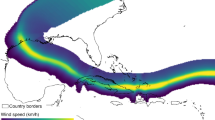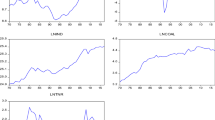Abstract
In this paper, we examine monetary responses to global oil price changes across a panel of seven major net oil consuming countries and three major net oil producing countries using monthly data from January 1986 to August 2013. Employing a variety of linear and nonlinear causality tests, our main findings are as follows. First, oil price movements directly affect monetary aggregates in both net oil consuming and net oil producing countries. Second, nonlinear causality tests reveal strong causal influences from oil prices to monetary aggregates. Third, nonlinear parametric and nonparametric models reveal oil price changes account for significant changes in monetary aggregates in Denmark, Germany, the Netherlands, and the US among net oil consuming countries and in Canada and Mexico among net oil producing countries. Finally, monetary aggregates in these countries respond nonlinearly only to oil price increases.

Similar content being viewed by others
References
Abderrezak A (2005) Oil price shocks—money supply causality: some evidence from Algeria. J North Afr Stud 10(2):173–181
Ajmi AN, Montasser GE, Nguyen DK (2013) Testing the relationships between energy consumption and income in G7 countries with nonlinear causality tests. Econ Model 35:126–133
Baek EG, Brock WA (1992) A general test for nonlinear granger causality: bivariate model. In: working paper. Iowa State University, Ames
Balke NS, Brown SPA, Yucel MK (1998). Crude oil and gasoline prices: An asymmetric relationship? Economic Review - Federal Reserve Bank of Dallas: 2–11
Banca d’Italia (2013) Statistics. Available at http://bip.bancaditalia.it
Barsky R, Kilian L (2004) Oil and the macroeconomy since the 1970’s. J Econ Perspect 18(4):115–134
Bell DNF (1996) A non-parametric approach to non-linear causality testing. Econ Lett 51(1):7–18
Bernanke BS, Ilian M (1998) Measuring monetary policy. Q J Econ 113(3):869–902
Bernanke BS, Gertler M, Watson M, Sims CA, Friedman BM (1997) Systematic monetary policy and the effects of oil price shocks. Brookings Papers on Economic Activity: 91–157
Bruno M, Sachs J (1985) Economics of worldwide stagflation. Harvard University Press, Cambridge
Carlstrom CT, Fuerst TS (2006) Oil prices, monetary policy, and counterfactual experiments. J Money Credit Bank 38(7):1945–1958
Chen Y, Rangarajan G, Feng J, Ding M (2004) Analyzing multiple nonlinear time series with extended Granger causality. Phys Lett A 324(1):26–35
Chiou-Wei SZ, Chen CF, Zhu Z (2008) Economic growth and energy consumption revisited — Evidence from linear and nonlinear Granger causality. Energy Econ 30(6):3063–3076
Cologni A, Manera M (2008) Oil prices, inflation and interest rates in a structural cointegrated VAR model for the G-7 countries. Energy Economics 30(3):856–888
Davis SJ, Haltiwanger J (2001) Sectoral job creation and destruction responses to oil price changes. J Monet Econ 48(3):465–512
De Nederlandsche Bank (2013) Domestic MFI-statistics (monetary). Available at http://www.statistics.dnb.nl
DeJong DN (1992) The power problems of unit root tests in time series with autoregressive errors. J Econ 53(1):323–341
Denker M, Keller G (1983) On U-statistics and v. mise’ statistics for weakly dependent processes. Z Wahrscheinlichkeitstheorie Verwandte Gebiete 64(4):505–522
Deutsche Bundesbank (2013) Statistics. Available at http://www.bundesbank.de/Navigation/EN/Statistics
Hamilton JD (1983) Oil and the macroeconomy since world war II. J Polit Econ 91(2):228–248
Hamilton JD (1988) Are the macroeconomic effects of oil-price changes symmetric?: A comment. Carn-Roch Conf Ser Public Policy 28:369–378
Hamilton JD (1996) This is what happened to the oil price-macroeconomy relationship. J Monet Econ 38(2):215–220
Hamilton JD (2003) What is an oil shock? J Econ 113(2):363–398
Hamilton JD (2011) Nonlinearities and the macroeconomic effects of oil prices. Macroecon Dyn 15(3):364–378
Hamilton JD, Herrera AM (2004) Oil shocks and aggregate macroeconomic behavior: the role of monetary policy. J Money Credit Bank 36(2):265–286
Hiemstra C, Jones JD (1994) Testing for linear and nonlinear Granger causality in the stock price‐volume relation. J Financ 49(5):1639–1664
Hiemstra C, Kramer C (1997) Nonlinearity and endogeneity in macro–asset pricing. Stud Nonlinear Dyn Econ 2(3):1–17
Hooker MA (1996) What happened to the oil price-macroeconomy relationship? J Monet Econ 38(2):195–213
Hooker MA (1999) The maturity structure of term premia with time-varying expected returns. Q Rev Econ Financ 39(3):391–407
Hoover KD, Perez SJ (1994) Post hoc ergo propter once more an evaluation of ‘does monetary policy matter?’ in the spirit of James Tobin. J Monet Econ 34(1):47–74
International Energy Agency (IEA) (2013) Statistics. Available at http://www.iea.org/stats/index.asp
Jiménez-Rodríguez R (2011) Macroeconomic structure and oil price shocks at the industrial level. Int Econ J 25(1):173–189
Jiménez-Rodríguez R, Sánchez M (2005) Oil price shocks and real GDP growth: empirical evidence for some OECD countries. Appl Econ 37(2):201–228
Jones DW, Leiby PN, Paik IK (2004) Oil price shocks and the macroeconomy: what has been learned since 1996. Energy J 25(2):1–32
Kanas A, Ma Y (2000) Testing for a nonlinear relationship among fundamentals and exchange rates in the ERM. J Int Money Financ 19(1):135–152
Keane MP, Prasad ES (1996) The employment and wage effects of oil price changes: a sectoral analysis. Rev Econ Stat 78(3):389–400
Kilian L (2008) A comparison of the effects of exogenous oil supply shocks on output and inflation in the G7 countries. J Eur Econ Assoc 6(1):78–121
Kilian L (2009) Not all oil price shocks are alike: disentangling demand and supply shocks in the crude oil market. Am Econ Rev 99(3):1053–1069
Kilian L, Park C (2009) The impact of oil price shocks on the U.S. stock market. Int Econ Rev 50(4):1267–1287
Korhonen I, Ledyaeva S (2010) Trade linkages and macroeconomic effects of the price of oil. Energy Economics 32(4):848–856
Kyrtsou C, Labys WC (2006) Evidence for chaotic dependence between US inflation and commodity prices. J Macroecon 28(1):256–266
Leduc S, Sill K (2004) A quantitative analysis of oil-price shocks, systematic monetary policy, and economic downturns. J Monet Econ 51(4):781–808
Lee CC, Chang CP (2007) Energy consumption and GDP revisited: A panel analysis of developed and developing countries. Energy Economics 29(6):1206–1223
Lee K, Ni S (2002) On the dynamic effects of oil price shocks: a study using industry level data. J Monet Econ 494:823–852
Lee BR, Lee K, Ratti RA (2001) Monetary policy, oil price shocks, and the Japanese economy. Jpn World Econ 13(3):321–349
Leeper EM, Zha T (2003) Modest policy interventions. J Monet Econ 50(8):1673–1700
Li J (2006) Testing Granger causality in the presence of threshold effects. Int J Forecast 22(4):771–780
Mackey MC, Glass L (1977) Oscillation and chaos in physiological control systems. Science 197(4300):287–289
Miguel C, Manzano B, Martin-Moreno JM, Ruiz J (2009) Disentangling the effects of oil shocks: the role of rigidities and monetary policy. Energy J 30(SI2):193–216
Schwert GW (1989) Tests for unit roots: a Monte Carlo investigation. J Bus Econ Stat 7(2):147–159
Seifritz W, Hodgkin J (1991) Nonlinear dynamics of the per capita energy consumption. Energy 16(3):615–620
Skalin J, Teräsvirta T (1999) Another look at Swedish business cycles, 1861–1988. J Appl Econ 14(4):359–378
Sotoudeh MA, Worthington AC (2014) Nonlinear interest rate effects of global oil price changes: the comparison of net oil-consuming and net oil-producing countries. Appl Econ Lett 22(9):693–699
Wang Y, Wu C, Yang L (2013) Oil price shocks and stock market activities: evidence from oil-importing and oil-exporting countries. J Comp Econ 41(4):1220–1239
World Bank (2013) Crude oil price, WTI, $/bbl. Available at http://www.quandl.com/worldbank
Wu MH, Ni YS (2011) The effects of oil prices on inflation, interest rates and money. Energy 36(7):4158–4164
Author information
Authors and Affiliations
Corresponding author
Rights and permissions
About this article
Cite this article
Sotoudeh, MA., Worthington, A.C. A comparative analysis of monetary responses to global oil price changes: net oil producing vs. net oil consuming countries. Int Econ Econ Policy 13, 623–640 (2016). https://doi.org/10.1007/s10368-015-0315-1
Published:
Issue Date:
DOI: https://doi.org/10.1007/s10368-015-0315-1




